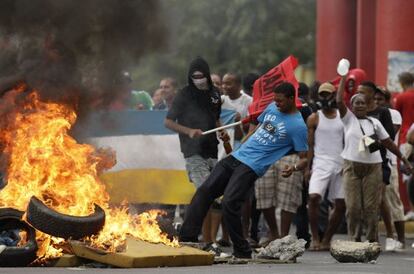Panamanian leader repeals duty-free-zone land law
Martinelli repealed bill after charging the opposition with trying to create instability in the country.

Under pressure following more than a week of violent protests over a new law permitting the sale of public land around the Colón Free Trade Zone, Panamanian President Ricardo Martinelli repealed the bill on Monday after charging the opposition with trying to create instability in the country.
The controversial law would have allowed the government to raise money by selling the land in Colón, the biggest free-trade zone in the Americas established 43 years ago on the eastern end of the Panama Canal.
Protestors in and around Panama's second-largest city Colón battled with police and looted stores, while demanding that the law not be enacted. They claim that the lands, in which they hold businesses, are part of the country's heritage.
Three people were killed and dozens were injured. In a televised speech Sunday night, Martinelli admitted that he made a mistake in trying to push the law through Congress but said it was the opposition parties that started the riots.
Mitchell Doens, of the opposition Revolutionary Democratic Party (PRD), said that the president "always blames his opponents for his problems."
"What we have here is a person with a lot of power and wealth who does whatever he feels like doing," said Doens.
Martinelli, who governs the Isthmus nation with a strong hand, had declared a curfew following the riots last week, but the residents of Colón ignored the order and stayed on the streets to protest.
Workers and residents closed down the free-trade zone, where hundreds of foreign-born merchants operate businesses for exports to neighboring Colombia, Venezuela, the Caribbean and the entire Central American region. Although residents and workers know that there is a lot of contraband and that a lot of the money made there goes into private accounts - the duty-free zone still contributes to seven percent of Panama's GDP - they criticized Martinelli for not initiating a dialogue with them before he introduced the law.
The police, who often use military tactics in handling disturbances, came out in full force and began shooting rubber bullets and tear gas at the demonstrators. The protests in Colón set off other disturbances by students in the capital Panama City.
Martinelli's decision to repeal the law is seen as a major defeat of his conservative party just less than a year before the next presidential race. By law, Martinelli cannot run for re-election but his opponents have been using the Colón protests to explain to voters why there is so much opposition to the current government.
Tu suscripción se está usando en otro dispositivo
¿Quieres añadir otro usuario a tu suscripción?
Si continúas leyendo en este dispositivo, no se podrá leer en el otro.
FlechaTu suscripción se está usando en otro dispositivo y solo puedes acceder a EL PAÍS desde un dispositivo a la vez.
Si quieres compartir tu cuenta, cambia tu suscripción a la modalidad Premium, así podrás añadir otro usuario. Cada uno accederá con su propia cuenta de email, lo que os permitirá personalizar vuestra experiencia en EL PAÍS.
¿Tienes una suscripción de empresa? Accede aquí para contratar más cuentas.
En el caso de no saber quién está usando tu cuenta, te recomendamos cambiar tu contraseña aquí.
Si decides continuar compartiendo tu cuenta, este mensaje se mostrará en tu dispositivo y en el de la otra persona que está usando tu cuenta de forma indefinida, afectando a tu experiencia de lectura. Puedes consultar aquí los términos y condiciones de la suscripción digital.








































